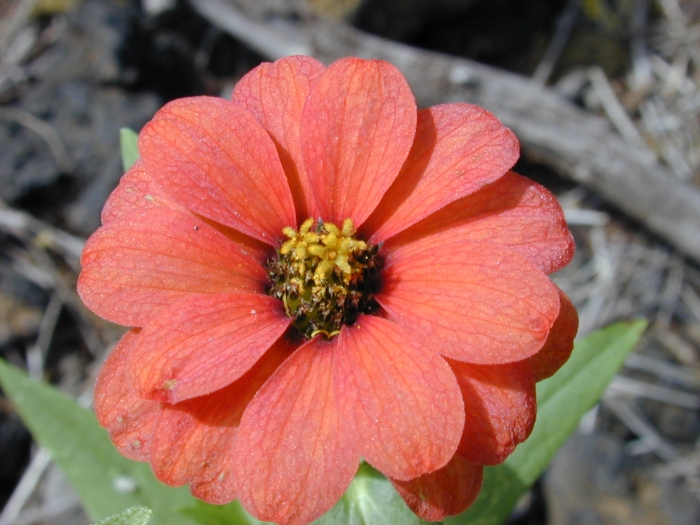Peruvian Zinnia
(Zinnia peruviana)
Peruvian Zinnia (Zinnia peruviana)
/
/

Forest & Kim Starr
CC BY 3.0
Image By:
Forest & Kim Starr
Recorded By:
Copyright:
CC BY 3.0
Copyright Notice:
Photo by: Forest & Kim Starr | License Type: CC BY 3.0 | License URL: https://creativecommons.org/licenses/by/3.0 | Uploader: BotMultichill | Publisher: Wikimedia Commons | Title: Starr_030202-0031_Zinnia_peruviana.jpg | Notes: |















































Estimated Native Range
Summary
Zinnia peruviana, commonly known as Peruvian Zinnia, is an annual herb that is native to dry grasslands and scrub in Southern USA, Central America and South America. It typically grows to a height of 50 cm, although it can occasionally reach up to 100 cm. The plant features erect stems that start green and may turn yellow or purple as they age. The lance-shaped leaves are opposite and can have a slightly rough texture. Peruvian Zinnia is known for its vibrant daisy-like flowers that bloom in summer and fall, showcasing a variety of colors including yellow, orange, pink, and red. The flowers are moderately showy and attract pollinators such as butterflies and bees.
Peruvian Zinnia is valued for its drought tolerance and vibrant, colorful flowers, which make it an excellent choice for xeriscaping, rock gardens, and borders in areas with dry climates. It is also used for cut flowers due to its long vase life. This plant thrives in full sun and requires minimal water once established, making it a low-maintenance option for gardeners. It prefers well-drained soils and can tolerate poor, sandy, or rocky soils. While it is generally pest-free, it can be susceptible to powdery mildew in humid conditions. Due to its potential to self-seed and become naturalized, it is considered invasive in some regions outside its native range, so gardeners should check local regulations before planting.CC BY-SA 4.0
Peruvian Zinnia is valued for its drought tolerance and vibrant, colorful flowers, which make it an excellent choice for xeriscaping, rock gardens, and borders in areas with dry climates. It is also used for cut flowers due to its long vase life. This plant thrives in full sun and requires minimal water once established, making it a low-maintenance option for gardeners. It prefers well-drained soils and can tolerate poor, sandy, or rocky soils. While it is generally pest-free, it can be susceptible to powdery mildew in humid conditions. Due to its potential to self-seed and become naturalized, it is considered invasive in some regions outside its native range, so gardeners should check local regulations before planting.CC BY-SA 4.0
Plant Description
- Plant Type: Herb
- Height: 1.5-2 feet
- Width: 0.75-1 feet
- Growth Rate: Moderate
- Flower Color: Yellow, Orange, Pink, Red
- Flowering Season: Summer, Fall
- Leaf Retention:
Growth Requirements
- Sun: Full Sun
- Water: Low
- Drainage: Medium
Common Uses
Bank Stabilization, Bee Garden, Bird Garden, Border Plant, Butterfly Garden, Deer Resistant, Drought Tolerant, Erosion Control, Hummingbird Garden, Low Maintenance, Potted Plant, Rabbit Resistant, Rock Garden, Salt Tolerant, Showy Flowers
Natural Habitat
native to dry grasslands and scrub in Southern USA, Central America and South America
Other Names
Common Names: Wild Zinnia, Field Zinnia, Spindelzinnia, Cabrón, Clavelón, Escopetón, Eterno, Garden Zinnia, Zinia, Zinia Del Monte
Scientific Names: , Zinnia peruviana, Zinnia hybrida, Zinnia florida, Zinnia multiflora, Zinnia pauciflora, Zinnia tenuiflora, Zinnia verticillata, Zinnia leptopoda, Zinnia revoluta
GBIF Accepted Name: Zinnia peruviana (L.) L.